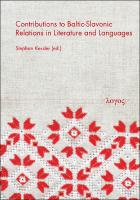Contributions to Baltic-Slavonic Relations in Literature and Languages
An Interdisciplinary Collection of Essays
Contributor(s)
Kessler, Stephan (editor)
Collection
Knowledge Unlatched (KU)Language
EnglishAbstract
As much as scholars of Baltic Studies always claim independence for the languages and literature it involves, it is evident that the Baltic and Slavic languages and literature have been and still are in latent contact and exchange. The historical processes had led to interwoven but distinct cultural spheres `on the border.' Our interdisciplinary collection of essays follows several borderlines: Teresa Dalecka (University of Vilnius) discusses the Polish literature in Lithuania since 1990 and the environment that created it. Stephan Kessler (University of Greifswald) sketches a framework of narration and applies it to a story written by Maks Fraj who lives in Lithuania but is from Odessa by origin. Anna Stankeviča, Inna Dvorecka, and Jekaterina Gusakova (each from the University of Daugavpils) give an overview of Latvia's Russophone book market and analyse Vadim Vernik's formula fiction. Sergei Kruk (Stradiņš University in Rīga) discusses the Latvian concept of linguistic integration that roots in the romantic notions of social homogeneity and language as being a shibboleth for successful integration. Nicole Nau (University of Poznań) highlights four techniques for the integration of Slavic verbs and verbal derivational affixes into Latgalian, based on material from the 19th to the 21st century. Anastasija Kostiučenko (University of Greifswald), investigates how the concept of hybridity can be used to describe and better understand the language area and identity issues in Southeast Lithuania.
Keywords
Language Arts & Disciplines; Literary Criticism; European; EasternDOI
10.30819/5497ISBN
9783832554972Publisher
Logos Verlag BerlinPublisher website
https://www.logos-verlag.com/Publication date and place
2022Grantor
Imprint
Logos Verlag BerlinClassification
Language: reference and general
Literature: history and criticism


 Download
Download